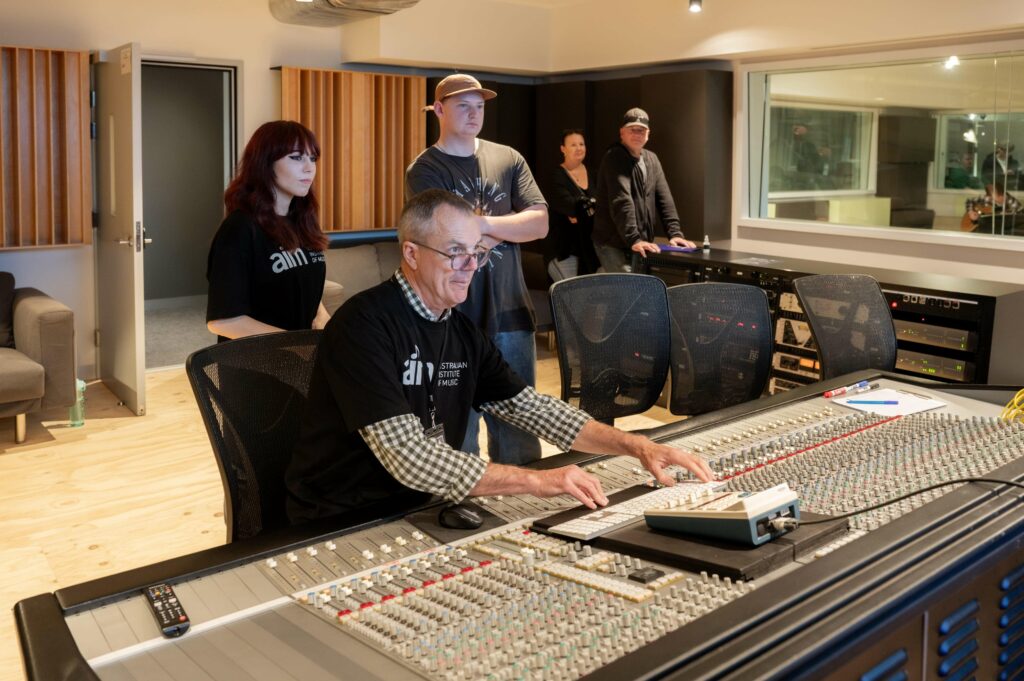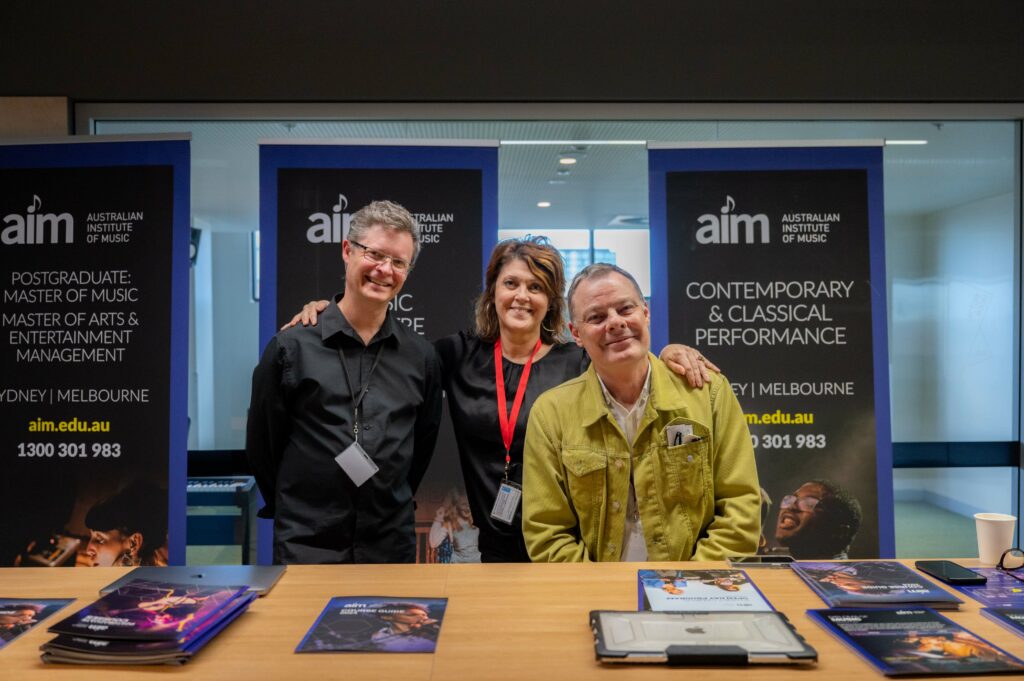For many young, aspiring music professionals, taking the big leap to turn your love of music from a hobby into a career can be a little daunting.
People often have a misconception that creative, or performance work is not ‘real work’ or that just a few musicians ‘make it’ in the music industry in Australia, while everyone else struggles to find a job. Friends and family might even be expressing doubts about whether you can have a great career with a qualification in music.
In fact, the Australian music market employs in excess of 300,000 people across music and performing arts, venues and live music, and independent songwriters, artists, composers, DJs and musicians. The 2023 revenue of the Australian music industry totalled approximately $994.3m.
With live music back on track after COVID-19, music industry professionals are now even reporting a skills shortage at virtually every level of the music events sector.
According to recent research on musicians’ salaries in the country and ‘Making Music Work,’ industry survey:
- the average salary of a musician in Australia is $108,000, with potential to increase by 9% by 2028
- surveyed professionals listed more than 560 different job titles,
- and more than 70% of music professionals surveyed have been working in the music industry for over 10 years.
Fortunately for all of us, Australia is home to a vibrant music economy which offers a hugely diverse range of careers across a broad spectrum of professional fields including music production, performance, education, events, and business management. These are highly skilled professions, requiring training and degree-level qualification.
Whatever degree path, instrument or industry training you choose, there is a music industry career out there with your name on it. Let’s take a look at our pick of the top 7 jobs in the music industry in Australia right now to see exactly how diverse this industry can be.
1. Music Management

For anyone with a head for business, good communication and organisation skills and a passion for supporting artists, a management role in the music industry might be the ideal career for you. There are a number of major but equally important management roles commonly available across the industry for those with some music business training:
- Tour Manager: books, organises and oversees concert tours.
- Artist and Repertoire (A&R) Manager: discover, sign and develop artists for release.
- Business Affairs Manager: manage the legal and contractual side of the business.
- Event Manager: Coordinate and organise all elements of live events and productions.
- Label Manager: Build your artists, market your releases and expand your label.
The right courses for the job: Bachelor of Arts and Entertainment Management, Bachelor of Music – Arts Management
2. Professional Musician

If you thought you couldn’t earn money as a professional musician, here’s some surprising news for you. According to a recent survey of Australian music professionals, the number one most common job was Instrumental Musician (25%) out of 560 job titles.
As a professional instrumentalist or vocalist, with some talent and training you will have a variety of career options open to you. You could perform on stage with an ensemble as an Orchestral Musician, record tracks as a freelance Session Musician, or make your own way as a Recording Artist.
The right courses for the job: Bachelor of Music – Performance (Contemporary),
Bachelor of Music – Performance (Classical), Bachelor of Music Theatre
3. Concert and Festival Promoter
Do you have a real knack for creating and marketing unforgettable live music experiences? As a Concert and Festival Promoter, your role is to organise and promote musical events, from intimate concerts to massive festivals. You’ll work with artists, venues, and marketing teams to ensure that music lovers have an amazing time.
The right courses for the job: Bachelor of Arts and Entertainment Management, Bachelor of Music – Arts Management
4. Musical Director

If you’re a person who loves to lead and shape musical performances, becoming a Musical Director might be your calling. Musical Directors oversee everything musical, from arranging compositions to guiding musicians during recording sessions, rehearsals, and performances, ensuring that the music comes to life beautifully. There are a few different types of Musical Director in the industry to choose from, including:
- Musical Director in Musical Theatre: leading the band and guiding performers.
- Musical Director for Events: curating and leading the music of private or public events.
- Musical Director in Radio: selecting and scheduling radio music programming.
The right courses for the job: Bachelor of Music – Performance (Contemporary),
Bachelor of Music – Performance (Classical), Bachelor of Music Theatre
5. Music Publisher
Music Publishing is one of the biggest employers in the music industry ecosystem, but the role of Music Publisher is often misunderstood. This important job title doesn’t mean publishing in terms of newspapers and magazines. In fact, Music Publishers are really the unsung heroes behind the scenes, ensuring that artists get paid for their work. A Music Publisher represents songwriters and composers, managing copyright, marketing and licensing their music.
The right courses for the job: Bachelor of Arts and Entertainment Management, Bachelor of Music – Arts Management
6. Film and Television Composer

Ever been moved by the music in a movie or TV show? That’s the magic of a Film and Television Composer. In this role, you create original scores and soundtracks that enhance the emotional impact of visual storytelling, crafting melodies that stay with audiences after the credits roll. Composers with this skill set are also in high demand within the advertising sector, where you can earn significant money as a Commercial Composer.
The right courses for the job: Bachelor of Music – Composition, Bachelor of Music – Performance (Contemporary)
7. Music Teacher or Lecturer

Did you know that around 10% of music professionals in the music industry in Australia teach music privately? If you’re passionate about sharing your musical knowledge and skills, becoming a Music Teacher or Lecturer can be an immensely rewarding career path to take. You can offer private lessons as a freelance Music Tutor, work in school music departments as a Music Teacher or Head of Music, or become a Music Lecturer, teaching students at a University level.
The right courses for the job: Bachelor of Music – Performance (Contemporary),
Bachelor of Music – Performance (Classical), Bachelor of Music Theatre
- For teaching at School: Followed by a Master of Education
- For teaching at University: Followed by a Master of Music
These top 7 jobs showcase the diversity of career opportunities within the music industry. For a full guide to 75 different careers you can have in the music industry in Australia, take a look here.
Each of these 100% ‘real jobs’ requires unique skills, expert industry training and dedication. Whether you’re drawn to organising concerts, composing, becoming a renowned artist in your own right or educating others about music, there’s a path in the music industry for you.




